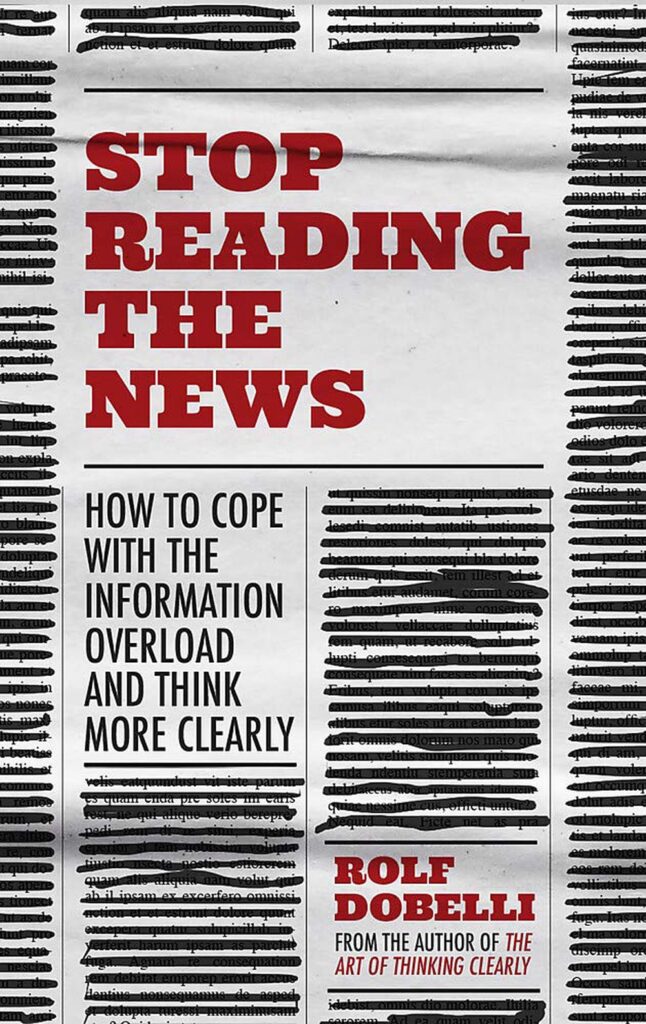Sharing my learnings from the book, Stop Reading the News by Rolf Dobelli
Stop Reading the News by Rolf Dobelli
Stop Reading the News is Dobelli’s manifesto about the dangers of the most toxic form of information – news. He shows the damage it does to our concentration and well-being, and how a misplaced sense of duty can misdirect our behaviour. Most importantly, he offers the reader the guidance on how to live without news, and the many potential gains to be had: less disruption, more time, less anxiety, more insights.

- News addiction has become widespread, with more of us glued to rolling updates than ever before. And as you’ll discover, it’s doing our mental and physical health no good. If that’s the case, why not give up the news completely?
- Growing up in Lucerne, Switzerland in the seventies, the news came from the paperboy and on the radio early in the morning. Then, there was the TV news and current affairs shows in the evening. But this wasn’t enough for Rolf Dobelli – by the age of 17, he was thoroughly addicted to the news.
- Then, one day, he suddenly noticed that he could no longer concentrate on books and longer articles. His mind gave up after just a few paragraphs without absorbing any of the content. And he began to suffer from anxiety. Dobelli realized that he must be suffering from information overload.
- What had all this news consumption brought him? Was he any wiser now? Was he any happier? Could he think more clearly? The answer to all of these questions was a resounding No.
- If you look at the front page of a newspaper or browse a news site, you’ll notice that most of the headlines will be bad news. Good news, like the introduction of a new law that protects workers from carcinogens, will almost never get the front-page treatment.
- human beings have something called a negativity bias. This means that negative information has twice the impact on us that positive information does.
- Sadly, this has a negative impact on the body. By consuming all of this news (which is nearly all bad news), you’re stressing your body out, weakening its ability to fight off infection, and potentially causing digestive and growth problems.
- Instead, you could do something real and concrete to help the suffering. All the time you spend “doom-scrolling” through the most recent catastrophe could be spent working overtime, so you could donate money to disaster-relief charities, for example.
- The key to breaking your news habit is by what Dobelli calls radical abstinence. You need to make a complete break. The best way to do this is to push through 30 days of no news at all. By the end of those 30 days, you’ll hopefully reach the point where you don’t feel the urge to peek at the headlines. By the end of these 30 days, you should be feeling the benefits – a new calm and the ability to think more clearly. In all likelihood, you won’t want to go back to your old ways.
- What should you do with all this new-found time? Instead of news, you could read actual books. You could read long-form articles written by experts. You could embark on a new course. A decent book or a long article can give you a more nuanced understanding of the world than the news media can ever provide.
- If you’re always reading the news, you’ll be learning about hundreds of different topics, but only in a fleeting way. You’ll never have the ability to focus on something properly.
- Warren Buffet, has something that he calls a circle of competence. Plainly speaking, this is what he knows best. For him, that’s the stock market. He knows about this perhaps better than anyone else. He doesn’t stray very far outside of this circle of competence.
- Cutting out the news doesn’t harm democracy. Democracy only functions when the truth is brought to light. There’s a clear difference between real journalism and “the news.” Journalism requires real digging, providing background information, and being able to tell complex stories. And that kind of journalism is the best for holding power to account.


Leave a Reply